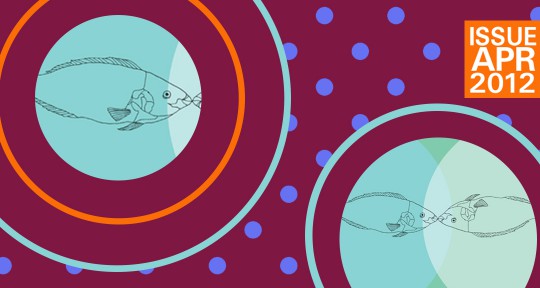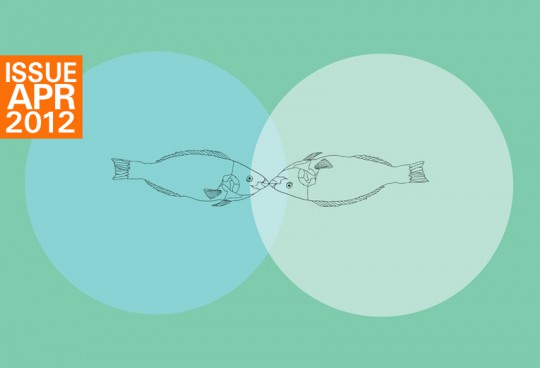Asymptote is featured in the January/February 2012 issue of Poets & Writers and mentioned for the first time at The Millions—we are given the fond nickname, “The Audible Antipodal,” I suppose, in a nod to our multimedia offerings? (Said multimedia offerings recently expanded to include full-screen immersive slideshows in all Visual articles at a whopping cost of USD1,100, out of pocket.) Dalkey Archive approaches me with an offer to edit the inaugural Best Asian Fiction Anthology, modeled after their Best European Fiction Anthology. But there’s a catch: I have to find a sponsor for the series (who would be willing to part with $85,000 per annum), and I would only get $5,000 for the editing gig. Given how hopeless I am at fundraising, then, this is not going to happen. One detail from our discussion sticks, however. Given the state of China-Taiwan relations, Dalkey Archive thinks Taiwan will be “tricky,” just as Macedonia was eventually dropped because Cypress did not want to be included in the same lineup as Macedonia (with its current name) in the European counterpart. Ah, politics. Here to introduce the Spring 2012 issue is contributing editor Adrian Nathan West.
Even a casual reader who spends time overseas will notice something odd about English-language publishing. Just recently, at my favorite bookstore, La Central in Barcelona’s Raval, I saw, set out on shelf displays or on tables, books by Virginie Despentes, Mircea Cartarescu, and Han Kang—all available in Spanish and Catalan translation. In the US and UK, in places where bookstores still exist, translation is treated, at best, as a genre—though many talented independent bookstores are trying to change this. The figure 3% is often bandied about as the proportion of translated books published in English; this is bad enough, but the figure may well be optimistic (the figures for poetry and fiction are available at the translation database at Three Percent). Those masochistic enough to read reviews at Amazon or goodreads will see the same absurd prejudices against translated literature crop up over and over again; while professional translators cannot help but be dismayed at the inveterate willingness of large publishers to fork over lavish advances to plodding has-beens while keeping at arm’s length writers of undeniable stature from other countries. The stereotype persists—translated literature doesn’t sell—and neither Knausgaard nor Ferrante have done much to change it.
Nor do journals and magazines provide much of a haven for readers who want to know what is happening elsewhere. While a cornucopia of poorly funded, university-based journals offers prospective writers and translators next-to-no visibility, more famous outlets, many of which state in their masthead a willingness to publish the new, the daring, and the uncategorizable, go on cranking out one mind-numbing workshop story after another. Then, up in the ether, are the Atlantic, the New Yorker, the Paris Review, and their ilk, at the gates of which the translator lingers like poor K. before the portal of Kafka’s castle.
Nietzsche famously remarked that the Renaissance was raised on the shoulders of a hundred men. The good literature that makes it into English, especially the literature from other countries, does so thanks to the efforts of far fewer. Every time a new journal or small press launches, it is a major event for literature; every time one closes, it is a disaster. When an unknown writer becomes a sensation, there is often the sense that he or she comes out of nowhere, but this is rarely the case: Krasznahorkai has been writing since the eighties, Elena Ferrante since the nineties, but only now are they getting their due in English. Recognition generally comes as the result of long, thankless, unpaid promotion on the part of writers, translators, editors, and other advocates.
Journals like Asymptote are essential to this process: spaces where established voices don’t crowd out newcomers, but where rigorous criteria ensure that the goods on offer are more than mere fluff. A particular advantage at Asymptote is the multitude of different voices who have input over the content; in many cases, these people are based where the authors translated reside, and can judge not only the work’s importance but the fidelity of the translation in question.
Asymptote helps provide a bridge between the obscurity of many smaller journals and websites and the apparent impregnability of the few magazines of reference. It is selective but not exclusionary; it does get things noticed; and it can often provide a better segue into print than a sample and a query letter sent blind to a publisher whose metastasizing slush pile is filled with every kind of tripe from My Little Pony fan fiction to the memoirs of 9/11 conspiracy theorists.
I say this from experience, because Asymptote has helped to get a number of the authors I translate into print. When I began working on Josef Winkler, he was virtually unknown—the two books translated by him in the mid-1990s hadn’t received a single review. Shortly after publishing an essay on his works and a short translation of his novelette Natura Morta in the Spring 2012 issue of Asymptote, I sent a link to my piece to Contra Mundum Press, who would eventually publish three of Winkler’s books, garnering reviews in the Guardian and the TLS. It didn’t hurt that my essay—the first piece of criticism I’d ever published—appeared alongside poems by Nerval, Mandelstam, and Mayakovsky, fiction by Etgar Keret and David Leavitt, and a specially commissioned essay on Somali authors by Granta Best Young British Novelist Nadifa Mohamed, in a journal that even in its first year had published two Nobel Prizewinners and translators of the caliber of Lydia Davis and Susan Bernofsky. Pere Gimferrer, arguably the greatest living poet in Spanish and Catalan, was similarly unknown in English when I published an excerpt of his novel Fortuny in Asymptote in January, 2013; I have now translated two of his books, with a third on the way next spring. I have repeatedly turned to Asymptote when I’ve wanted to shed light on some little-known author who’s interested me; and with Jean Améry, with Marianne Fritz, with Hermann Burger (which our editor-in-chief also arranged to be published at The Guardian), I have managed to find publishers not long after their work has appeared there.
Asymptote is free. Neither the editors, nor the translators, nor the authors are paid. In an ideal world, it would be otherwise, but the preponderance of free content on the internet makes a paid subscription model difficult for a subject with a small—but growing!—audience like literary translation. This does not mean it is free to produce. Hopefully these words about the importance of the journal to the writers and translators it has presented to the world will encourage you to contribute to its survival.
Adrian Nathan West has been Asymptote’s contributing editor since October 2012.
Become a masthead member or a sustaining member today and receive great perks!
*****
Read more from our #30issues30days showcase:


